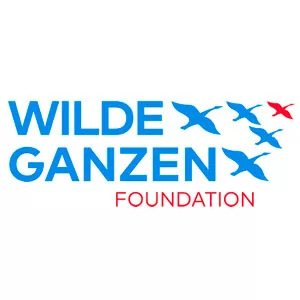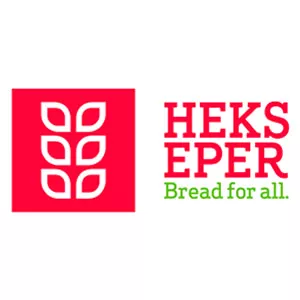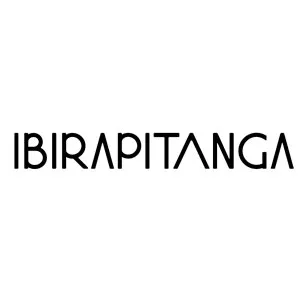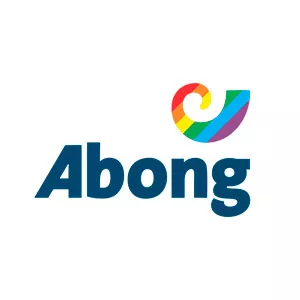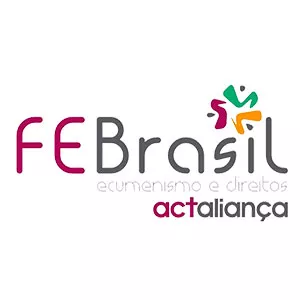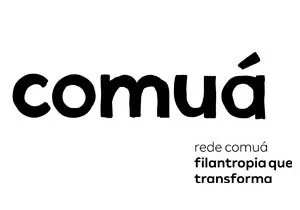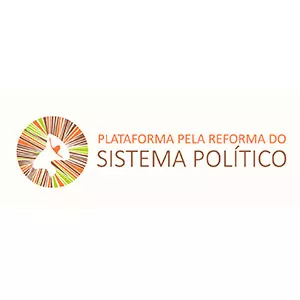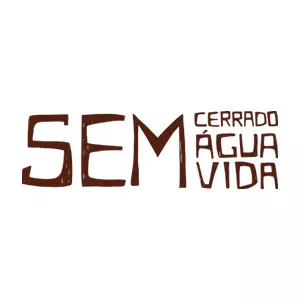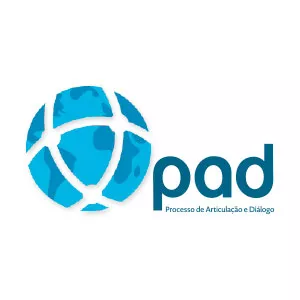Ecumenical and inter-religious TAPIRI unites faith leaders and traditional peoples at the Peoples’ Summit in Belem.
01 de October de 2025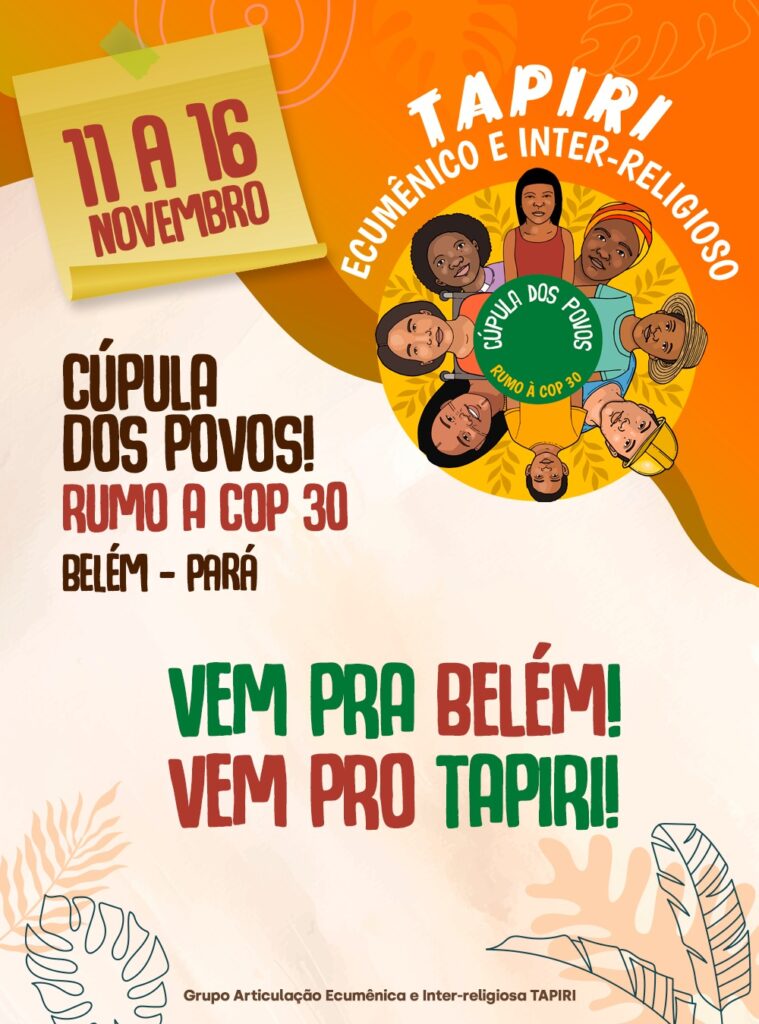
Belém, PA – 29 September 2025
Between 11 and 16 November 2025, the city of Belém (in Pará), will host the Ecumenical and Inter-religious Tapiri at the Peoples’ Summit, a large gathering bringing together leaders of various religious traditions, indigenous peoples, quilombola communities, African-origin religions, social movements and young people from Brazil and the world. The event, which will take place in the Santa Maria Anglican Cathedral (in Portuguese) (Av. Serzedelo Corrêa, 446 – Nazaré) will provide a space for dialogue, forming alliances and drafting proposals to influence discussions at the 30th UN Conference on Climate Change (COP30).
Organized by a collective of ecumenical, inter-religious and human rights organizations (full list below), the Tapiri is an itinerant initiative which, since 2022, has travelled around the 9 states of the Legal Amazon. The 2025 edition opens out its scope to a global perspective, inviting international voices from Canada, Australia and other Latin American countries to engage in discussions with various Brazilian contexts. The backdrop will be the COP30 and its implications for a less unequal and environmentally sustainable future for all peoples and ecosystems.
TAPIRI is an indigenous word meaning “a tent that shelters those who roam.” In recent years, the Tapiri ecumenical and inter-religious coalition has denounced the impacts of religious fundamentalism and racism on the lives of traditional peoples. Through reflections and concrete actions, the Tapiri seeks to build networks of resistance and care.
Programme Structured around Central Themes of Struggle
The six-day programme is organized around four central themes of the Peoples’ Summit: (1) Land, Territory and Sovereignty; (2) Climate Justice, Democracy and Rights; (3) Tackling Religious and Environmental Racism; (4) The Central Role of young people, children, adolescents, women and a range of LGBTQIAPN+ communities. Activities include roundtable debates, conversation circles, cultural interventions, the launch of publications; a symbolic parade of boats on the Guamá River; a vigil, celebrations and a march.
Programme Highlights:
- 11/11 (Tuesday): The event will begin with a Seminar run by the Process of International Networking and Dialogue (Processo de Articulação e Diálogo: PAD), presenting the overview and discussing international cooperation strategies. In parallel, the Curupira Project of the Anglican Episcopal Church of Brazil (Igreja Episcopal Anglicana do Brasil: IEAB) will hold a roundtable discussion “Voices from the Land” exchanging indigenous knowledge about climate and sustainability between peoples from Brazil, Latin America and Oceania.
- 12/11 (Wednesday): Inter-religious ritual and reading joint declaration. Two central roundtables to debate “Inter-religious Dialogue to Tackle Environmental Racism and Rights Violations, and Strengthen Grassroots Participation” and “Climate Justice, Democracy and the Right to Life: Inter-religious Dialogue for Environmental Justice”, with attendance confirmed by Don Vicente Ferreira, Moema Miranda (Church and Mining – in Portuguese) and Prosecutor Felício Pontes. The afternoon will include a parade of boats on rivers in the region, culminating in the symbolic opening of the Peoples’ Summit.
- 13/11 (Thursday): The day will be dedicated to the struggles for land and sovereignty with a roundtable discussion on “Water, Land and Sovereignty: How Large-scale Projects Threaten Indigenous and Traditional Peoples – Resistance, Agroecology and Reparations in the Amazon, Latin America and Oceania.” In the afternoon, the roundtable will focus on religious racism and the quilombola struggle – “Land, Axé and Resistance: Religious and Environmental Racism, Megaprojects and the Fight for Sovereignty in African-origin Religious Houses and Quilombola Territories in Brazil”, with participation by Mother Nalva, Mameto Nangetu and quilombola leaders from Maranhão and Tocantins. The day will end with a March and Vigil – TAPIRI for the Land, organized by the Institute of Religious Studies (Instituto de Estudos da Religião: ISER – in Portuguese).
- 14/11 (Friday): The morning will involve the voices of young people, women and the LGBTQIAPN+ population at the centre of the struggle for climate justice. In the afternoon, the roundtable discussion will be: “Climate Justice and Rights in the Amazon: How can Organizations Contribute to Tackling Violations and Environmental Racism, and Ensuring Grassroots Participation?”
- 15/11 (Saturday): The final day will begin with the March of the Peoples’ Summit, starting at 8.30 am. In the afternoon, we will resume Tapiri activities with a Roundtable about “Faith, Climate Justice and Democracy: Ecumenical Pathways to Tackle Environmental Racism and Guarantee Rights,” mediated by Maíra Fernandes (United Religions Initiative: URI), which will include the final reading of the Tapiri document, combining the meeting’s demands and proposals for COP30.
- The day will close with a reception to launch publications by the participating organizations.
- 16/11 (Sunday): The event will close with an Inter-religious Celebration at the Anglican Cathedral, conducted by Bishop Marinez Bassotto, Primate of the IEAB and the Rev. Ives Vergara, symbolizing the union of different faiths towards a common goal.
Service:
What: Ecumenical and Inter-religious Tapiri – Towards COP30
When: 11 to 16 November 2025
Where: Santa Maria Anglican Cathedral – Av. Serzedelo Corrêa, 446 – Nazaré, Belém, Pará
Press Contact: Patricia Gordano /+55 71 999787846 / patricia@cese.org.br
For more information, see: www.cese.org.br and the sites of the TAPIRI member organizations
Participate: https://form.jotform.com/252674710081050
COME TO BELÉM! COME TO THE TAPIRI!
TAPIRI member organizations:
1. Amazon Council of Christian Churches (Conselho Amazônico de Igrejas Cristãs: CAIC)
2. House of Peace (Casa da Paz)
3. House of United Religions (Casa das Religiões Unidas)
4. Santa Maria Anglican Cathedral (Catedral Anglicana de Santa Maria, IEAB-DAA), Belém/Pará
5. Ecumenical Coordination of Service (Coordenadoria Ecumênica de Serviço: CESE)
6. Sister Joselha’s Social Centre House (Centro Social Casa Irmã Joselha)
7. Christian AID
8. Dorothy Stang Dorot Committee (Comitê Dorothy Stang Dorot)
9. Pará Inter-religous Committee (Comitê Inter-religioso do Pará)
10. IEAB Brazil’s Commission on Public Advocacy, Human Rights and Combating Racism (Comissão de Incidência Pública, Direitos Humanos e Combate ao Racismo da IEAB, Brasil)
11. Anglican Episcopal Church of Brazil (Igreja Episcopal Anglicana do Brasil: IEAB)
12. National Council of Christian Churches of Brazil (Conselho Nacional de Igrejas Cristãs do Brasil: CONIC)
13. Anglican Diocese of Brasilia’s Department of Advocacy, Human, Environmental and Territorial Rights (Departamento de Advocacy, Direitos Humanos, Ambientais, e Territoriais da Diocese Anglicana de Brasília)
14. Anglican Diocese of the Amazon (Diocese Anglicana da Amazônia)
15. Anglican Diocese of Brasilia (Diocese Anglicana de Brasília)
16. ACT (Brazil) Ecumenical Forum (Fórum Ecumênico ACT: FEACT Brasil)
17. Faith in the Climate (Fé no Clima) / Institute of Religious Studies (Instituto de Estudos da Religião: ISER)
18. Evangelical Front for the Rule of Law – Pará Centre (Frente de Evangélicos pelo Estado de Direito – Núcleo Pará)
19. Lutheran Foundation of Diakonia, Council of Mission among Indians’ Programme for the Defence of Rights (Fundação Luterana de Diaconia: FLD) (Programa Conselho de Missão entre Índios – COMIN de Defesa de Direitos)
20. United Presbyterian Church of Brazil (Igreja Presbiteriana Unida do Brasil: IPU)
21. Ilê Yaba Omi Afro-Brazilian Cultural Institute (Instituto Afro-brasileiro e Cultural Ilê Yaba Omi: ACIYOMI)
22. Koinonia Ecumenical Presence and Service (Koinonia – Presença Ecumênica e Serviço)
23. Laudato Si’ Movement (Movimento Laudato Si’)
24. Renew Our World Movement Brazil (Movimento Renovar Nosso Mundo Brasil)
25. We of Creation (Nós da Criação)
26. Luciano Mendes de Almeida National Observatory for Socio-environmental Justice (Observatório Nacional de Justiça Socioambiental Luciano Mendes de Almeida: OLMA)
27. Evangelical Church of the Lutheran Confession in Brazil (Igreja Evangélica de Confissão Luterana do Brasil: IECLB), Belém, Pará
28. First United Presbyterian Church of the Amazon (Primeira Igreja Presbiteriana Unida da Amazônia)
29. Process of International Networking and Dialogue (Processo de Diálogo e Articulação: PAD)
30. Curupira Project (Projeto Curupira)
31. Amazonizar Network (Rede Amazonizar)
32. Churches and Mining Network (Rede Igrejas e Mineração)
33. Ecumenical Water Network (Rede Ecumênica da Água: REDA)
34. Pan-Amazonian Ecclesial Network Brazil (Rede Eclesial Pan-Amazônica Brasil: REPAM Brasil)
35. Renew Our World (Renovar Nosso Mundo)
36. Interfranciscan Service for Justice, Peace and Ecology (Serviço Interfranciscano de Justiça, Paz e Ecologia: SINFRAJUPE)
37. Mansu Mansumbandu Kenkue Neta African-origin Religious Worship House (Terreiro Mansu Mansumbandu Kenkue Neta)
38. United Religions Initiative (Iniciativa das Religiões Unidas: URI)
39. United Society Partners in the Gospel (USPG)
40. Indigenous Missionary Council (Conselho Indigenista Missionário: CIMI)


